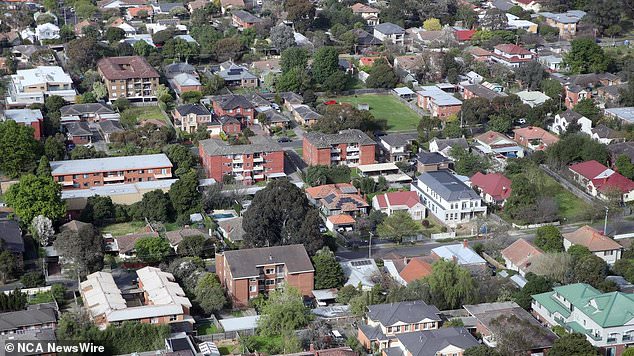As many as 100,000 homes could be empty in one of Australia’s biggest cities, even as renters and home seekers struggle to secure a place to stay as prices soar due to a crippling supply shortage.
Analysis of water meter data by tax reform advocacy group Prosper Australia suggests about 5.2 per cent of Melbourne dwellings were empty in 2023, with about 27,000 dwellings, or 1.5 per cent of the stock, left vacant throughout the year.
“We found that more than 27,000 homes, or 1.5 percent of all housing, were left completely empty throughout 2023,” said Prosper’s director of research and policy, Dr. Tim Helm.
‘If underused dwellings that record less than a quarter of the average water consumption per person during the year are included, a total of almost 100,000 dwellings, or one in every 20 dwellings in the entire city, were empty.’
‘That’s equivalent to two and a half years of new construction, which is enough to house everyone on Victoria’s public housing waiting list twice over.
“It is a shocking waste that so many homes are left empty during a rental crisis and the fact that these numbers continue to rise speaks to the state of inequality.”
The national rental vacancy rate, or the proportion of properties available for rent, stands at 1.42 percent, according to REA PropTrack data.
In Melbourne, the vacancy rate is 1.5 percent.
Analysis of water meter data by tax reform advocacy group Prosper Australia suggests about 5.2 per cent of Melbourne homes were empty in 2023, with about 27,000 homes, or 1.5 per cent of the stock, left vacant throughout the year.
Since March 2020, the national rate has fallen 43 percent as rising demand for housing outstrips supply.
The dramatic imbalance has pushed up average weekly rents, with the national average for apartments now sitting at $584, up 9.8 percent over the past year.
State and federal governments are now scrambling to correct the dramatic imbalance between housing supply and demand.
In Victoria, the state government is increasing its tax on vacant residential land to crack down on properties that remain empty for long periods.
From January 1 next year, the VRLT will apply to dwellings across Victoria if they are vacant for more than six months during the previous calendar year, the government announced in May.
The tax currently only applies to Melbourne’s inner and central suburbs.
A progressive tax rate will also apply based on the number of consecutive years the land has been subject to the VRLT.
The government hopes the policy will free up more housing options by encouraging landlords to rent out their properties.
“We know we need more housing for Victorians and by cracking down on empty properties we are alleviating the housing pressures being felt across the state,” Victorian Treasurer Tim Pallas said.
‘Expanding the tax on empty homes will free up vacant homes for rent and sale, increasing supply and making housing more affordable.’
Prosper researchers advocate tax reform to undermine the incentive to speculate on rising home and land values.
“It is a mistake to treat vacant homes as a minor problem when it comes to housing affordability,” Dr. Helm said.
‘Putting just a fraction of Melbourne’s vacant housing stock into use would improve access to housing.’
There were 1,043,776 unoccupied dwellings across the country in the 2021 census, ABS reports.

Think Forward chief executive Thomas Walker says proper exploitation of existing stocks is a “solution that is right before our eyes”. Image: supplied
Thomas Walker, chief executive of Think Forward, said better utilisation of existing stock was “a solution that was staring us in the face”.
“Young people are left to cope with the housing crisis on their own, with a vague promise that there will be more supply at some point in the future,” he said.
‘But Prosper points out that there is a solution right before our eyes: better utilisation of our existing stocks.
‘The large scale of vacancies supports growing calls to address how property is taxed.
‘We can continue to enrich speculators in the hope that some of the supply will reach those who need it.
“Or we can rethink how property is taxed, shifting the rewards of speculation to the actual provision of housing to people.”


